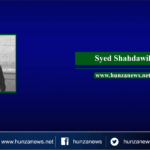HunzaNews April 14th, 2014.
“The Accidental Prime Minister,” by Sanjaya Baru, who served as media advisor to Indian Prime Minister Manmohan Singh from 2004 to 2008, has stirred a political storm in India by detailing the extent to which the prime minister was handicapped by Congress party president Sonia Gandhi. Such lack of independence meant that ministers saw themselves as drawing their power from Gandhi and reducing the stature of the prime minister.
Despite such political restraints, Singh went out of his way for two things, the Indo-US nuclear deal and relations with Pakistan. While he achieved the former, the latter was obstructed by political developments in Islamabad, terrorist attacks in India and opposition from within his party. This remains his greatest regret, Baru writes in the book.
Singh pursued a four-point formula with General Musharraf to resolve the Kashmir dispute, which would “make borders irrelevant”. He propounded this vision twice in speeches at Amritsar, deliberately in Punjabi as they were also aimed at people across the border.
When in early 2005 General Musharraf wanted to visit India for talks with the excuse of a cricket match, Singh did not have the backing of his hawkish colleagues, with the good excuse of the Indian parliament being in session as a bad time for a high-level Indo-Pak summit. Singh’s foreign secretary Shyam Saran and internal security advisor MK Narayannan disagreed with the idea as they thought Pakistan was not ready to solve disputes.
To surpass this opposition, the Indian prime minister surprised everyone by announcing in parliament that he had decided to invite General Musharraf to watch a cricket match. Members of parliament thumped their desks, indicating approval.
Soon before Musharraf’s visit, the bus terminal in Srinagar from where he along with Gandhi had to flag off the first Srinagar-Muzzafarabad bus the next morning was hit by a bomb attack. Following the attack, all security advisors told him to cancel the visit but he went ahead. Soon, Musharraf’s visit went off well, unlike the fears many had that Musharraf would walk away with a PR coup of the sort he did with Vajpayee in Agra.
The visit marked the beginning of serious back-channel negotiations conducted between Pakistan’s envoy Tariq Aziz and his Indian counterpart Satinder Lambah. These negotiations were kept so secret that when Lambah met Dr Singh in his office, the meetings were not listed in the PM’s official appointments lest the PMO officials and the (Indian) intelligence agencies get wind.
In the book, Baru writes, “While there has been some criticism of Singh’s Siachen proposal in India, the fact is that he pursued this idea only after consulting retired army generals who had actually commanded the troops at Siachen… All of them supported Singh’s decision…”
The Indian prime minister thus felt there would be far more criticism of the Musharraf-Manmohan formula in Pakistan, and suggested to the former president that he sell the idea as the Musharraf formula, owning and making it popular in Pakistan.
Similarly, in India Singh expected criticism only from the right-wing opposition Bharatiya Janata Party (BJP), he was surprised to find opposition from within his Congress party, particularly the then defence minister Pranab Mukherjee and his successor in the ministry, AK Antony.
Baru describes Antony as “politically conservative and risk averse”. While he supported a peace initiative with Pakistan, he was opposed to a deal on Siachen. The then army chief, General JJ
Singh, privately made supportive noises but publicly supported Antony, claims Baru. The retired general has refuted these claims.
While Baru does say that many serving generals were opposed trusting Pakistan with Siachen demilitarisation, his claims about Antony are a first. So far, the lack of consensus on Siachen has been blamed more on the military hawks rather than political ones. Baru speculates that Antony’s opposition could have been the voice of Sonia Gandhi, as the Gandhi family may have been averse to a non-Gandhi prime minister solving a mess of Nehru’s making, and thus potentially overshadowing the family. “I felt that she would want to wait till Rahul took over as PM,” he writes.
Express Tribune





















